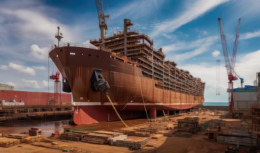
While first world politicians try to phase out fossil fuels, in capital-hungry countries rich in natural resources like Brazil, oil is still king.
First world countries are in the energy transition race and are trying to eliminate fossil fuels, but this reality has not arrived in countries that need capital and are rich in natural resources like Brazil, where oil is still king. Last week, Petrobras, the world leader in oil exploration and production in deep and ultra-deep waters, announced investments of US$13 billion in the Campos Basin and promises to generate jobs, taxes, royalties, special participations and dividends!
Read also
- Brazil does not deserve to be slowed down in its growth and development, by measures that interfere in the management of a company like Petrobras
- New technology shields steel from the destructive action of corrosion and revolutionizes the industry worldwide, replacing costly traditional methods of blasting, mechanical treatment and painting, in addition to lasting up to 10 years without the need for shutdown or maintenance
- Leading mining multinationals in Latin America invest in smart security to accelerate growth in the sector
- The Brazilian oil giant chooses the oil company SBM Offshore for the 26-year charter of the largest FPSO platform in Brazil that will be installed in the largest deep-water oil field in the world
- Portugal invites Brazilian labor for 400 jobs to work at the French multinational Natixis; There is no age limit
To the delight of Brazil's oil professionals, if the energy transition is taking place around the world, it has not yet reached the streets of Ilha da Conceição, the Niterói neighborhood at the center of Rio de Janeiro's oil renaissance.
There, buses and trucks crowd the Baker Hughes shipyard, where the energy services giant lays hundreds of miles of oil and gas pipeline. Across the street, Exxon Mobil loads supplies to explore the country's largest offshore oil fields. Royal Dutch Shell and TotalEnergies have similar year-end plans.
Brazil wants to double oil production by 2030 to become the fifth largest exporter in the world
While first world politicians try to phase out fossil fuels, in capital-hungry, resource-rich countries like Brazil, oil is still king. With the exception of the United States and OPEC, Brazil is the country that is expected to increase crude oil production the most until 2026.
In 2020, as the rest of the world limited oil production amid the pandemic, Brazil was one of the few increasing production, more than any other non-OPEC nation except Norway. Brazil wants to double oil production by 2030 to become the world's fifth largest exporter, and even if it doesn't reach that target, low-cost oil fields have positioned the country well to emerge as one of the world's last strongholds in the energy transition. .
Currently, Brazil is recovering and is experiencing the best moment of recent years. Energy transition? If you've got oil, why not drill to the last drop?
With the country's world-class oil reserves, favorable legislation and broad political support for the oil and gas industry, hundreds of millions of dollars are being spent finding new wells.
According to Schreiner Parker, vice-president for Latin America at consulting firm Rystad Energy, in 10 years, large oil companies may stop pursuing these types of massive expansion projects. But until then, they need to secure supplies that last until 2040 with consumption still rising, especially in China.
ANP expects drilling of new wells to quadruple this year
All this makes the South Atlantic a kind of safe haven for an industry that is increasingly fleeing the weakening of the economic model and more aggressive climate policies elsewhere. The ANP expects drilling of new wells to quadruple this year, to 19. Rystad has a more modest forecast for oil exploration, predicting a doubling of the number, with even more wells being drilled next year.
“All the big companies are getting ready to drill,” said Roberto Monteiro, CEO of Petro Rio. “The action is here.”
Despite the resumption, the Brazilian oil industry shows a scenario far removed from a decade ago, currently the investments of the Brazilian oil giant Petrobras, represent only a fraction of the US$ 40 billion per year that the state-owned company spent during the years of expansion.
We can point out that no matter how many wells are being drilled, it does not mean that oil production will necessarily increase as much as the government forecasts. Much like the US shale gas fields, this intense activity is partly necessary, if only to maintain current production levels as productivity from older wells begins to decline.
At the same time, expanding oil production should boost exports even more to hungry consumers in Asia.
According to the Minister of Mines and Energy, Bento Albuquerque, the energy transition is a warning sign so that as much oil as possible is discovered before it starts to be eliminated, although the country is simultaneously betting on biofuels and seeking to reduce emissions from oil and gas operations to meet climate targets.
Owner of world-class assets with high value generation, Petrobras will install three new platforms in the Campos Basin and many job openings will be generated over the next five years
Between 2021 and 2025, Petrobras plans to invest US$ 13 billion in businesses in the Campos Basin, mainly for the revitalization of oil fields and promises to generate jobs, taxes, royalties, special participations and dividends. At the same time, companies that acquired fields in the region that were operated by Petrobras have promoted a dynamism in the oil and gas sector and prospects for an increase in local economies.
At least six new companies started operating in the region, with prospects of leveraging production. Increased production will generate greater returns for society through taxes, royalties, special participation, jobs and dividends. According to data from the Federation of Industries of the State of Rio de Janeiro (firjan), four of the companies that bought assets in the region have already submitted development plans totaling R$13,2 billion.
It is part of Petrobras' strategy to continue to produce heavily in this important oil basin, and a major renovation plan is underway, with investments already being made and forecast for the coming years. Petrobras has invested US$ 10 billion in the region over the last 53 years, putting more than 270 wells into operation, in addition to 10 new production systems.
Owner of world-class assets with high value generation, Petrobras is going to install three new platforms in the Campos Basin over the next five years. The installation of two platforms in the Marlim field is scheduled for 2023 – with the capacity to produce, together, 150 thousand barrels of oil per day (bpd) and process 560 thousand barrels of liquids per day – and a unit for 2024 for the integrated complex of Parque da Baleias, with the potential to alone produce 100 thousand bpd of oil and process 240 thousand barrels of liquids per day.













Air Force F-16 fighters…
True friend, what they shot down were…
Air Force F-16 fighters…
I would like to know what planet you live on…
Air Force F-16 fighters…
Everything is fine, 100-year secrecy,…
Air Force F-16 fighters…
Well... It's flying scrap... Typical...
Air Force F-16 fighters…
Which genocide are you talking about? Than…
If you control boarding times like…
Good afternoon, Work in the Netherlands has…
TO GENERATE ELECTRIC POWER, YOU HAVE TO…
It has up to 1000km/h in final tests in…
I want to register
The problem is not having the expense…
I am a cnc operator and inspector of…